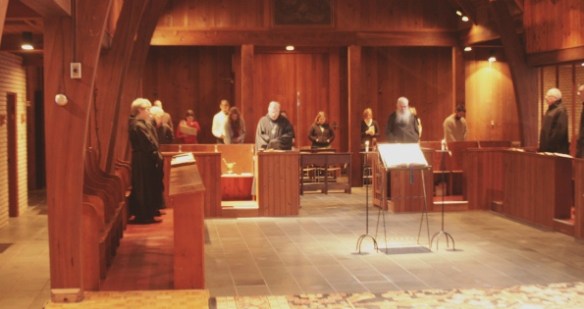 The rich man who asked Jesus what he needed to do to inherit eternal life and then walked away grieving when Jesus told him to sell all that he owned (Mk. 10: 21) is a warning to all of us, rich or poor. Jesus’ added warning that it “is easier for a camel to go through the eye of a needle than for someone who is rich to enter the kingdom of God” only makes the warning all the more dire. Paul strengthens the warning further when he tells Timothy that “the love of money is a root of all kinds of evil,” (1 Tim. 6: 10) Bucking these warnings is our formation from earliest childhood that money is both good and necessary and more of it is always better than less.
The rich man who asked Jesus what he needed to do to inherit eternal life and then walked away grieving when Jesus told him to sell all that he owned (Mk. 10: 21) is a warning to all of us, rich or poor. Jesus’ added warning that it “is easier for a camel to go through the eye of a needle than for someone who is rich to enter the kingdom of God” only makes the warning all the more dire. Paul strengthens the warning further when he tells Timothy that “the love of money is a root of all kinds of evil,” (1 Tim. 6: 10) Bucking these warnings is our formation from earliest childhood that money is both good and necessary and more of it is always better than less.
Money is not an individual matter; money is a system. It has to be if it’s going to be a medium of exchange. As a system, money gains power over all of us who use it. This is a power that easily distorts the moral conscience. In this regard, it is telling that in the commandments Jesus lists to the rich man, all are from the Ten Commandments except “You shall not defraud.” (Mk. 10: 19) Perhaps this is an eleventh commandment, or perhaps it is a version of: “You shall not covet.” (Ex. 20: 17) The more power money gains over us, the more likely it is that we will defraud others in order to get more of it. Indeed, most rich people in Palestine gained their wealth at the expense of poor farmers during hard times. Amos denounces those who “ trample on the poor and take from them levies of grain.” (Am. 5: 11) Such people turn “justice to wormwood, and bring righteousness to the ground.” (Am. 5: 7) Here we see courts of justice and the spoken word brought in with oppression of the poor as one knotted system.
The thought of the French thinker René Girard demonstrates that economic systems, like other interlocking social systems, are part of an all-pervasive system generated by what Girard called “mimetic desire.” That is, when one person wants something, other people are more apt to want it. The more somebody wants something, the more other people want it, not because of the intrinsic vale of whatever is valued but because something is valued. The interlocking of shared desires permeates society, making society a more tightly knotted system than the economical one. This is what the tenth commandment not to covet is all about. Jesus’ eleventh commandment deepens the tenth: you shall not steal what you covet because you have the social and economic power to do so. Coveting is not a vice only for the rich. I am among those who are seriously offended by what some preachers call “the Prosperity Gospel,” which seems to contradict Jesus’ words to the Rich Man. Somewhere (sorry, I can’t remember where), I read that many people who are attracted to the “Prosperity Gospel” are not rich but poor. In mimetic desire, other people model desires for other people. That is, other people tell me and show me what to desire. In the case of the “Prosperity Gospel,” rich people model to the poor what they should desire. We see the same phenomenon among Jesus’ disciples when, after being told how hard it is for a rich person to enter the Kingdom of God, asked Jesus: “Then who can be saved?” (Mk. 10: 26) The economic system, then, is fueled by the deeper system of mimetic desire wherein everybody wants to be like the rich landlords who break the tenth and eleventh commandments.
Jesus, then, is not inviting one person who happens to be rich to change; Jesus is asking all of us to change in such a way that the system is changed. The omnipresence of mimetic desire makes it clear that, important as it is to reform economic structures, it isn’t enough to do the job on its own. Our hearts need a makeover individually and collectively. It is this new system of the heart that Jesus inaugurated at the beginning of his teaching ministry when he proclaimed a Jubilee of freedom from being either a debtor or a creditor. (Lk. 4: 16–21)
St. Paul’s collection for the Church of Jerusalem (2 Cor. 8: 1–15) can be seen as an example of what economy can look like if we give our hearts to the tenth and eleventh commandments. Interestingly, the Macedonians, out of their poverty “overflowed in a wealth of generosity on their part.” (2 Cor. 8: 2). This makes one wonder if the Macedonians were more able to thread the eye of the needle than the Rich Man. Paul adds a Christological dimension with the example of Jesus who, though he was rich, yet for our sakes he became poor, so that by his poverty we might become rich. (2 Cor. 8: 9) Jesus was asking the Rich Man and each of us to do what He Himself had already done by coming into our world and its systems driven by mimetic desire. Here mimetic desire becomes redirected to desiring the good of other people, giving new vitality to Jesus’ famous words quoted by Paul: “It is more blessed to give than to receive.” (Acts 20: 35)
See also my blog post: Paul’s Collection for Jerusalem.
For an introduction to René Girard and his theory of mimetic desire, see: Violence and the Kingdom of God and Living Stones in the House of the Forgiving Victim.
